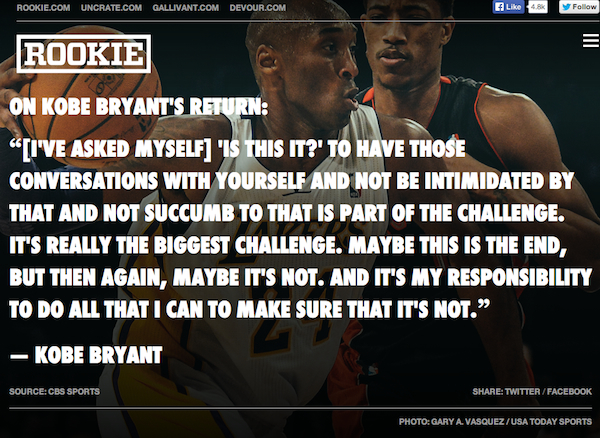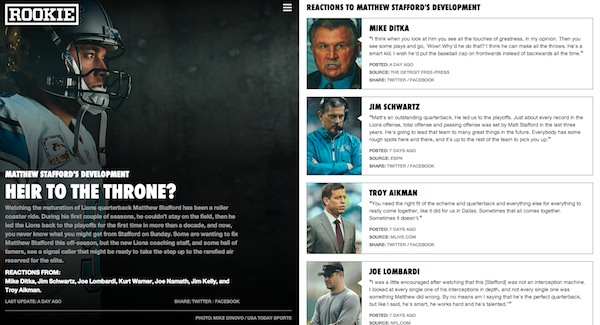
L.C. Angell says he builds websites with himself as the target reader. So when Angell, the creator of the highly curated men’s shopping site Uncrate and the viral video site Devour, decided to launch a site covering sports, he had his own interests in mind.
Angell wanted a site that could provide a sports news fix about the leagues he cared about, but which was both more digestible than a traditional 700-word article and which could cut through the noise of Twitter.
Enter Rookie.
First, before you do a spit take: Tavi Gevinson’s much lauded Rookie Magazine hasn’t suddenly shifted its target audience from teen girls to NFL fans. This is rookie.com, not rookiemag.com.
Here’s what a Rookie story looks like: On the left, a big photo and a concise paragraph about its topic, like whether the Detroit Lions’ Matthew Stafford is an elite quarterback. On the right, a half dozen or more quotes — from players, coaches, executives, pundits, or reporters — discussing the topic at hand. In the case of Stafford, Rookie pulled quotes from ex-players like Joe Namath and Troy Aikman, ex-coaches like Jim Schwartz and Mike Ditka, and others. That’s pretty much it: a summary paragraph and a set of quotes. The story as a whole is sharable, but so are each of the individual quotes.

“To me, I just don’t even care what my buddies are saying about the game. It’s a waste of time,” Angell said, explaining one way Rookie differs from Twitter. “I want to know what LeBron James thinks about Russell Wilson winning the Super Bowl.
Rookie likes to choose stories that will have a long shelf life, and it keeps updating them with new developments or quotes. A couple weeks ago, it posted a storyline about former Texas A&M quarterback Johnny Manziel and his prospects in the NFL draft. New quotes continue to be added to the post (Jerry Jones thinks he’ll be a star), and it’ll continue to be updated through Draft Day in May. And Angell envisions stories that span years, such as the NFL’s concussion crisis, that could have hundreds of quotes on one page. “That would be an amazing resource to have one URL to that,” he said. (Think of it as a low-friction analog to the recent interest in explainers that unite disparate content into a single, digestible web page.)
A team of four runs the site, and they aggregate the quotes from other news organizations as well as Twitter and Facebook, linking back to the original source.
Since the rise of the web, there’s been a low-voltage, long-lasting discussion around what is or should be the “atomic unit of news.” In a print world, that was an easy discussion: the article. But in the disaggregated online context, is it the fact? The tweet? The listicle item? The Wikipedia-style summary, unbound by news hook constraints?
Could quotes be next? They’ve played a key role in journalism forever, of course; if aggregators assemble bits and pieces of other people’s stories, those stories assemble bits and pieces of other people’s comments. Increasingly, they come direct from the source to the public without a middleman: Think of how many athletes use their Twitter accounts for the sort of comments that previously would have gone through a local beat reporter. Their brevity would seem to line up well with social media. (And, from a business point of view, quotes from public figures don’t come with a price tag.)

Angell is betting the atomic quote has a future, and even wants it to eventually become a platform for athletes to share their thoughts on the sports news of the day without worrying about trolls on Twitter. He said he is not quite yet sure how it would work, but Angell said he has spoken with athletes who have expressed interest in being able to post their thoughts directly to Rookie’s ongoing threads about various topics.
“Twitter is kind of horrible for professional athletes,” Angell said. “In terms of whether they do something good or something bad, these guys can’t even look at their ‘@’ messages, basically is what these guys told me. It makes them mad. They want to respond, and then they look horrible for responding to these things.” (Of course, some use it for inspiration.)
Rookie’s Facebook and Twitter followings are still small, and a search for “@Rookie” on Twitter still brings up more results for Gevinson’s Rookie than for the sports site. (For what it’s worth, Angell says he isn’t concerned with his site getting confused with Gevinson’s: “Our target audience is different enough that there shouldn’t be any confusion.” Rookie editors have also taken to Twitter to defend the name.)
Angell is convinced that Rookie’s choice, timely quotes on the sports news of the day will attract a following. Rookie already covers the NFL, NBA, MLB, and NASCAR, with plans to expand into other pro sports, but not college sports. He says the site’s simple design, which is responsive to mobile devices and tablets (an app is in the works), and its striking photography will help set it apart from other websites in the crowded world of sports media.
The site has launched without ads, but Angell said there will eventually be advertising on Rookie. Still, he said readers are used to overwhelming sports sites like ESPN.com or Bleacher Report and are not accustomed to Rookie’s stripped down design.
“A lot of people, honestly, don’t get it. I had to put a little how-to on the story pages. It’s crazy, but this website is so simple they weren’t used to a simple website.”